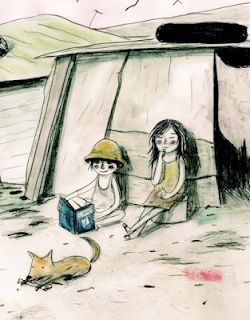translator (Spanish): Yanitzia Canetti
illustrator: Isabelle Malenfant
Annick Press, 2016 (English), 2018 (Spanish) Grades 1-5
Latin American
On the cover are two children with dirty faces, behind what will soon be revealed as a mountain of trash. Slightly smiling, they invite young readers into their lives. The two represent the thousands of children who work as garbage pickers in parts of Latin America, and hundreds of thousands in parts of Asia and Africa.
These young garbage pickers comb the smelly mountains of trash, looking for anything that can be sold as recyclables—or even barely edible food—to bring home to their families. Going to school is a fantasy, as may be owning a book or a pair of boots. It’s filthy and dangerous, mind-numbing work: deadly accidents and robberies are everyday occurrences, and parents pray that their children will return home safe at the end of the day.
Pablo encuentra un tesoro and Pablo Finds a Treasure tell the story of a resilient young brother and sister who experience the impoverishment of thousands of anonymous children who live in unnamed slums and daily scour the dumps of Mexico (“pepenadores” is Mexican Spanish for “trash-pickers”) or one of the countries known as the Northern Triangle of Central America—El Salvador, Guatemala, and Honduras.
While Pablo works, he dreams of a better life, but his older sister, Sofía, is more realistic. When he finds un tesoro—a treasure of a torn-up book—and tells Sofía that he wants to learn to read, she’s not impressed: ¿Para qué? she asks. ¡La lectura no llenará tu estómago! (“Reading won’t fill your stomach!”) Later, Sofía finds “el segundo tesoro del día”: two carrots—soft but not yet rotten—which they eat quickly and silently: “En la montaña, es mejor comerse enseguida cualquier comida que uno encuentre, o alguien se la robará.” (“On the mountain, it’s best to gobble up any food that you find, or someone will steal it.”)
Pablo finds the third tesoro, a broken gold chain: “En su mano sucia, el metal precioso brilla como un rayo de sol”—whose precious metal, “in his dirty hand, shines like a ray of sun”—that has Sofía and Pablo fantasizing about what it will buy.
Pablo dreams of a book, a soccer ball, a new pot for their mamá, and an ice cream; and Sofía dreams of a chicken for dinner every day of the week, a bag of caramels, a new dress for their mamá, and gloves to protect their hands while digging in the trash.
But when “Cara-Sucia”—“Dirty Face,” one of the violent and menacing robbers who roam the dump, accosts the two children, he takes everything that they’ve worked for all day, and they return home, empty-handed.
Except not. After a scolding from his frustrated sister, Pablo opens his mouth—and reveals the hidden treasure. In the final illustration, the two children, relaxed and happy, are leaning against their casita. Pablo is looking at his tattered book, Sofía is savoring a caramel, and their dog is licking at a large bone. A well-deserved respite from a hard day.
Malefont’s smudged, dark gray charcoal illustrations, heavy with symbolism, effectively portray both the children’s harsh reality and their sometimes-hopeful expressions; while light splashes of pale color call attention to their successful treasure-hunting moments. Young readers will notice, for instance, Sofía’s waving a blue boot in the air, while the children’s brown dog runs to show them a newly killed rat. Their floating fantasies are in color as well: a red book, brown chicken in a pot, green gloves, cherry ice cream, and wrapped caramels.
Young children know about poverty, and Pablo encuentra un tesoro and Pablo Finds a Treasure provide an excellent opportunity for educators to introduce a conversation about poverty and power and the connection to their own lives; and about child labor and children’s rights. At higher grade levels, Pablo encuentra un tesoro and Pablo Finds a Treasure are invaluable in extended conversations about the roots of power and how it can build or destroy entire communities and even governments; and about community, national, and world movements to redirect power for the benefit of everyone. Pablo encuentra un tesoro and Pablo Finds a Treasure are treasures.
*Highly recommended for all home, classroom, and library collections.
—Beverly Slapin

